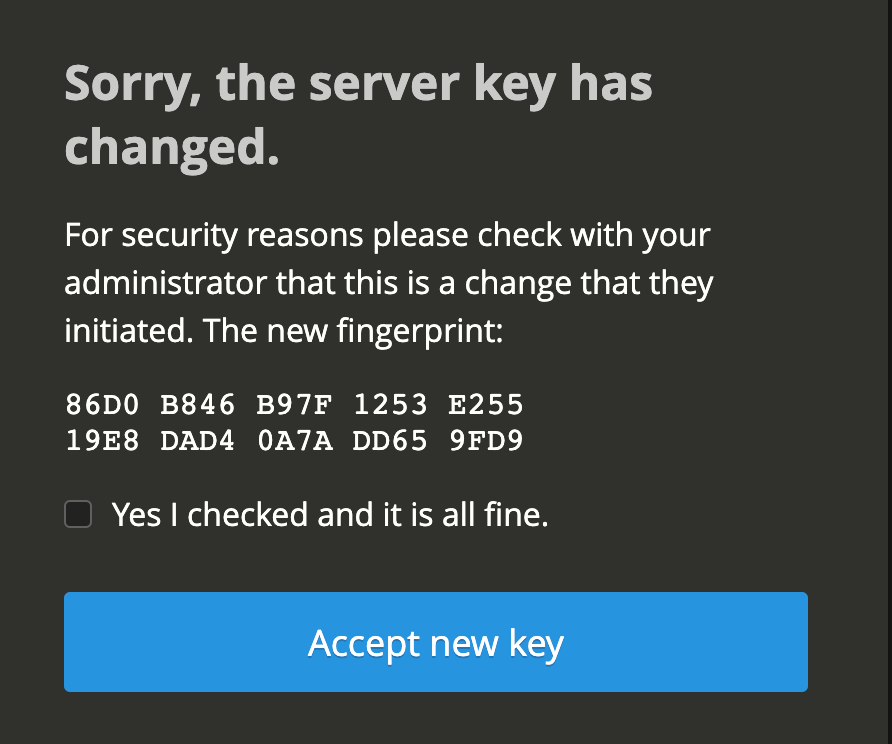How can I rotate the server GPG keys?
Docker installation
It is quite simple with docker to rotate your passbolt server GPG keys. Connect yourself inside the passbolt container and delete the keys:
rm /etc/passbolt/gpg/serverkey.asc
rm /etc/passbolt/gpg/serverkey_private.asc
Destroy then recreate passbolt container and new GPG server keys will be generated.
docker compose up -d --force-recreate
Other installations
Create a temporary GPG home folder:
mkdir /tmp/gpg-temp
Generate new GPG keys:
gpg --homedir /tmp/gpg-temp --batch --no-tty --gen-key <<EOF
Key-Type: RSA
Key-Length: ${PASSBOLT_KEY_LENGTH:-3072}
Key-Usage: sign,cert
Subkey-Type: RSA
Subkey-Length: ${PASSBOLT_SUBKEY_LENGTH:-3072}
Subkey-Usage: encrypt
Name-Real: ${PASSBOLT_KEY_NAME:-Passbolt default user}
Name-Email: ${PASSBOLT_KEY_EMAIL:-[email protected]}
Expire-Date: ${PASSBOLT_KEY_EXPIRATION:-0}
%no-protection
%commit
EOF
Replace the current GPG server keys with the new ones:
gpg --homedir /tmp/gpg-temp --armor --export ${PASSBOLT_KEY_EMAIL:-[email protected]} | sudo tee /etc/passbolt/gpg/serverkey.asc > /dev/null
gpg --homedir /tmp/gpg-temp --armor --export-secret-key ${PASSBOLT_KEY_EMAIL:-[email protected]} | sudo tee /etc/passbolt/gpg/serverkey_private.asc > /dev/null
Ensure new GPG keys owner and group are correct. Replace www-data with nginx if you are using RPM-based Linux distribution.
sudo chown www-data:www-data /etc/passbolt/gpg/serverkey_private.asc
sudo chown www-data:www-data /etc/passbolt/gpg/serverkey.asc
Get new GPG keys fingerprint from public key:
sudo gpg --show-keys /etc/passbolt/gpg/serverkey.asc | grep -Ev "^(pub|sub|uid|$)" | tr -d ' '
Ensure the fingerprint from private key is the same:
sudo gpg --show-keys /etc/passbolt/gpg/serverkey_private.asc | grep -Ev "^(pub|sub|uid|$|sec|ssb)" | tr -d ' '
CentOS 7 gpg command is quite old and has no –show-keys parameter. Use these commands instead:
# public key fingerprint
sudo cat /etc/passbolt/gpg/serverkey.asc | gpg --with-fingerprint - | grep -Ev "^(pub|sub|uid|$)" | tr -d ' ' | sed 's/Keyfingerprint=//'
# private key fingerprint
sudo cat /etc/passbolt/gpg/serverkey_private.asc | gpg --with-fingerprint - | grep -Ev "^(pub|sub|uid|$|sec|ssb)" | tr -d ' ' | sed 's/Keyfingerprint=//'
Open /etc/passbolt/passbolt.php configuration file and replace old fingerprint with the new one in the passbolt section:
'passbolt' => [
// GPG Configuration.
// The keyring must to be owned and accessible by the webserver user.
// Example: www-data user on Debian
'gpg' => [
// Main server key.
'serverKey' => [
// Server private key fingerprint.
'fingerprint' => 'XXXXXXXXXXXXXXXXXXXXXXXXXXXX',
'public' => CONFIG . DS . 'gpg' . DS . 'serverkey.asc',
'private' => CONFIG . DS . 'gpg' . DS . 'serverkey_private.asc',
],
],
Launch a healthcheck command to get passbolt GNUPGHOME folder (usually /var/lib/passbolt/.gnupg but can be different if you installed passbolt from source):
sudo -H -u www-data bash -c "/usr/share/php/passbolt/bin/cake passbolt healthcheck --gpg" | grep GNUPGHOME
Delete the current GNUPGHOME folder, it will be automatically recreated.
sudo rm -rf /var/lib/passbolt/.gnupg
On next connection through web interface, you will get a warning that the server key has been changed:

You can now delete the temporary GPG home folder:
rm -rf /tmp/gpg-temp